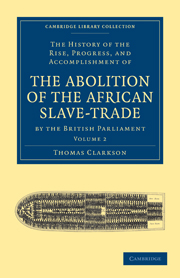Summary
The resolution adopted by the Commons, that the trade should cease in 1796, was a matter of great joy to many; and several, in consequence of it, returned to the use of sugar. The committee, however, for the abolition did not view it in the same favourable light. They considered it as a political manœuvre to frustrate the accomplishment of the object. But the circumstance, which gave them the most concern, was the resolution of the Lords to hear evidence. It was impossible now to say, when the trade would cease. The witnesses in behalf of the merchants and planters had obtained possession of the ground; and they might keep it, if they chose, even till the year 1800, to throw light upon a measure which was to be adopted in 1796. The committee found too, that they had again the laborious task before them of finding out new persons to give testimony in behalf of their cause; for some of their former witnesses were dead, and others were out of the kingdom and unless they replaced these, there would be no probability of making out that strong case in the Lords, which they had established in the Commons. It devolved therefore upon me once more to travel for this purpose: but as I was then in too weak a state to bear as much fatigue as formerly, Dr. Dickson relieved me, by taking one part of the tour, namely, that to Scotland, upon himself.
- Type
- Chapter
- Information
- The History of the Rise, Progress, and Accomplishment of the Abolition of the African Slave-Trade by the British Parliament , pp. 461 - 464Publisher: Cambridge University PressPrint publication year: 2010First published in: 1808

